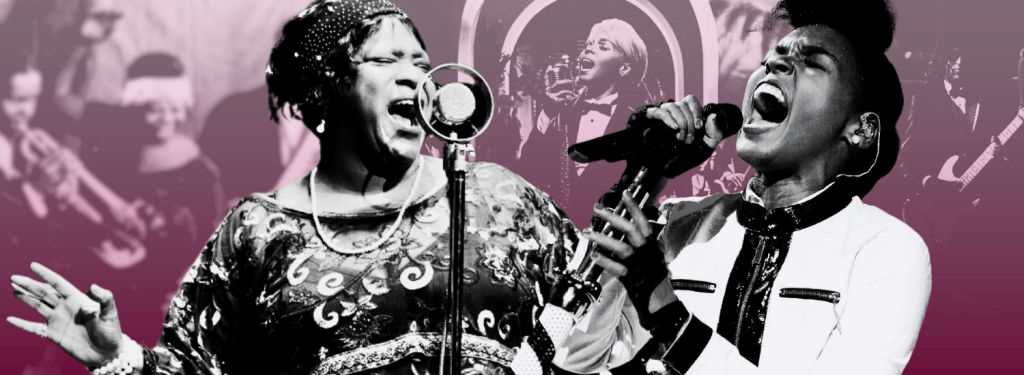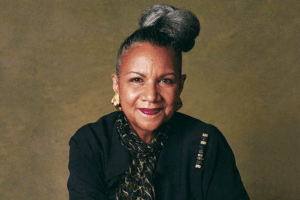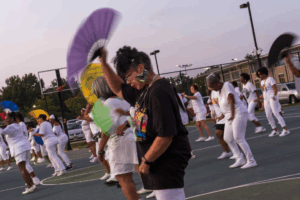By Joshua Levi Perrin
This month Unerased | Black Women Speak celebrates the Pride of Black Music with a hearty homage to the influence of queer Black women artists whose voices were never silenced or erased.
The stage is dark, the audience hushed. A lone figure steps into the spotlight, microphone in hand, ready to break barriers and defy norms.
This scene has played out countless times in the history of music, but when we speak of Black queer women in this narrative, the impact resonates on a frequency that shakes the very foundation of societal norms. From Ma Rainey to Janelle Monáe, Black queer women have carved out spaces of resistance, creativity, and acceptance in a world that often sought to erase them.
At the turn of the 20th century, Ma Rainey emerged as a blues powerhouse. Dubbed the “Mother of Blues,” Rainey was not just a musical innovator; she was a trailblazer in her unapologetic expression of her sexuality. Her songs like “Prove It on Me Blues” dared to speak openly about love and relationships with women at a time when such topics were taboo.
Rainey’s boldness laid the groundwork for future artists, like her protégé Bessie Smith, who used their music as a platform for honesty and self-expression. Rainey’s raw, unfiltered musical storytelling offered a form of solidarity and visibility.
Fast forward to the 21st century. Janelle Monáe stands as a testament to the evolution of this legacy. Monáe’s artistry is a kaleidoscope of futuristic sounds, compelling narratives, and striking visuals. Her 2018 album “Dirty Computer” is a fearless exploration of identity, sexuality, and freedom. In a society that often imposes rigid norms, Monáe’s work is a clarion call for acceptance and self-love.
Openly identifying as pansexual, she intertwines her music with activism, advocating for LGBTQ+ rights. Songs like “Make Me Feel” are anthems of liberation, celebrating the complexity and beauty of queer love.
The influence of Black queer women in music is expansive and includes artists like Meshell Ndegeocello, whose soulful basslines and introspective lyrics have earned her critical acclaim.
Ndegeocello’s music is a deep dive into the soul, blending elements of funk, jazz, and rock. Her work pushes boundaries and redefines genres, bringing her unique experiences and perspectives to the forefront. This diversity in her sound continues to enrich the musical landscape.
Big Freedia, the queen of Bounce music, is another trailblazer who challenges norms and expands the genre’s boundaries. Her dynamic performances and infectious energy have brought Bounce music from the streets of New Orleans to international stages.
Freedia’s unapologetic presence and vibrant expression of gender fluidity inspire countless fans and artists alike, showcasing authenticity and self-acceptance as powerful tools for social change.
Tracy Chapman, with her evocative voice and poignant lyrics, emerged as a powerful force in the late 1980s. Her debut album, featuring the iconic “Fast Car,” addressed issues of poverty, race, and gender with a sincerity that resonated globally.
Chapman’s influence was once again recognized with uproarious applause at her Grammy Awards comeback, showcasing the enduring power of her music and its relevance in contemporary discourse. Her return to the Grammy stage this year reminded the world of the timelessness of her voice in bringing social issues from the sidelines to the center.
Toshi Reagon, singer-songwriter and activist, has also made significant contributions. Raised by musician parents, her mother, Bernice Johnson Reagon, founded the all-woman a cappella group Sweet Honey in the Rock and her father, Cordell Hull Reagon, was a leader of the Student Nonviolent Coordinating Committee. Daughter Toshi’’s blend of folk, rock, and gospel is her lineage that delivers a powerful narrative of music and activism.
These artists spark conversations about intersectionality of, race, class, and sexuality — dialogue essential in understanding the multifaceted experiences of Black queer women. By bringing these issues to light, artists like Rainey, Monáe, Ndegeocello, Big Freedia, Chapman, and Reagon contribute to a broader movement towards equality and justice.
As we look to the future, the legacy of Black queer women in music remains vital. Emerging artists continue to draw inspiration from those who came before them, infusing their work with the same spirit of defiance and creativity.
The music industry is slowly becoming more inclusive, and the voices of Black queer women are at the forefront of this change.
The influence of Black queer women in music is a testament to the power of authenticity and resilience. Their stories remind us that true artistry is about breaking barriers and paving the way for future generations. In their songs, we find the echoes of resistance, the rhythms of freedom, and the melodies of change.
Joshua Levi Perrin is a writer for Unerased | Black Women Speak and senior communications manager for the Center for the Study of Social Policy.




